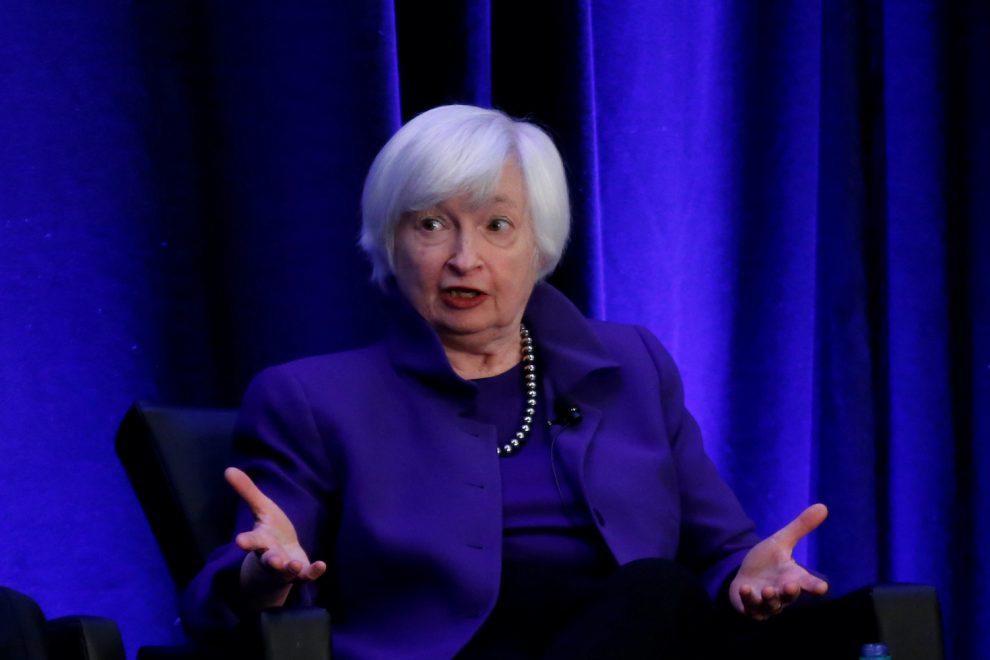The United States is pushing the G20 grouping to adopt a global minimum corporate tax to stem the erosion of government revenues, US Treasury Secretary Janet Yellen told the Chicago Council on Global Affairs on Monday.
In a speech ahead of her first International Monetary Fund and the World Bank’s spring meetings as Treasury chief, Yellen signaled stronger US engagement on issues from climate change to human rights to tax base erosion.
Just a few days after President Joe Biden announced plans to raise corporate taxes to finance a massive $2 trillion infrastructure and jobs program, Yellen said a collective international effort would end the “30-year race to the bottom” on taxation.
Biden has expressed outrage at multinationals – like Amazon – that have moved to tax havens or used loopholes and pay little to no tax, far less than some individuals, and said he would put a stop to the practice.
His plan would raise the US corporate tax rate to 28%, while eliminating some deductions associated with overseas profits. It would lift the minimum for multinationals to 21%. The administration says the plan will discourage the shifting of jobs and profits overseas.
Biden dismissed concerns the higher rate would drive companies overseas, telling reporters on Monday that “there’s no evidence of that.”
“We’re talking about a 28% tax that everybody thought was fair enough for everybody,” he said.
“I’m going to push as hard as I can (to) change the circumstances so we can compete with the rest of the world.”
Yellen has also dropped a key Mnuchin demand from international tax negotiations – a provision that would allow large US technology companies to opt out of any new rules on taxation of digital services.
She said the practice of seeking tax havens erodes government revenues and undermines an economy’s competitiveness.
“Together we can use a global minimum tax to make sure the global economy thrives based on a more level playing field in the taxation of multinational corporations,” she said in her speech.
Without a global minimum, the United States would again have higher rates than a number of other major economies, tax experts say, while the US proposal could help jump-start negotiations for a tax deal among major economies.
World Bank President David Malpass said finance leaders from the Group of 20 major economies will discuss global tax issues on Wednesday, including for digital services, adding that international attitudes were shifting away from continual tax reductions.
“Taxes matter to development, and it’s important that the world get it right,” Malpass told CNBC television.
Separately, a group of Democratic senators unveiled a legislative proposal to roll back parts of former President Donald Trump’s 2017 US tax cuts.
Stable tax system wanted
Yellen said the interconnected global economy had seen “a 30-year race to the bottom on corporate tax rates.”
But for companies and economies to remain competitive, governments must make sure they “have stable tax systems that raise sufficient revenue to invest in essential public goods and respond to crises, and that all citizens fairly share the burden of financing government.”
Biden’s proposal recognizes “it is important to work with other countries to end the pressures of tax competition and corporate tax base erosion,” Yellen said.
G20 finance ministers are expected to discuss the proposal during a virtual meeting tomorrow night (Asian time) that will be hosted by Italy.
A Treasury official told reporters the G20 goal is to have a proposal on the global minimum tax by July, and the Biden administration could if needed change its legislation to bring the US minimum tax into line with the international plan.
Talks with OECD
A G20 agreement would give a push to ongoing negotiations in the broader Organization for Economic Cooperation and Development (OECD) on a global minimum tax as a way to protect all members from erosion of tax revenues.
“Taxes matter to development and it’s important that the world get it right,” World Bank President David Malpass said on CNBC. He declined to comment on the US proposal, which will be a topic for the G20 officials on Wednesday.
Yellen’s speech, ahead of the spring meetings of the IMF and World Bank, plus the G20 meeting – all virtual – also outlined the Biden administration push to resume the multilateral cooperation halted under former president Donald Trump.
“Over the last four years, we have seen firsthand what happens when America steps back from the global stage. ‘America first’ must never mean America alone,” Yellen said.
In fact a strong US presence is necessary to ensure a level playing field in the global economy, she said. “Over time, a lack of global leadership and engagement makes our institutions and economy vulnerable.”
The Biden administration already announced it is rejoining the Paris climate accords, and removed obstacles in the World Trade Organization that allowed the global body to name a new leader.
In the trade arena, she said Washington will work with partners to “enforce a rules-based order.”
With China – the world’s other dominant economy – the relationship “will be competitive where it should be, collaborative where it can be, and adversarial where it must be.”
• Reporting by AFP, Reuters
This report was upgraded on January 19, 2022 for style purposes.
ALSO SEE:
Trillion dollar man: Biden unveils vast new jobs package
The changing world of work will need more infrastructure flexibility
China’s infrastructure REITs programme faces a bumpy path
























